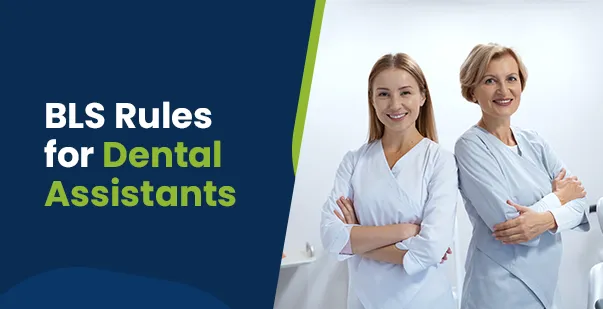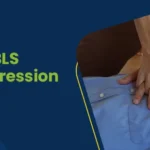Table of Contents:
- Introduction
- Why Is BLS Certification Mandatory for Dental Assistants?
- How Does BLS Differ From CPR Training for Dental Assistants?
- What Are the Common Dental Office Emergencies?
- How to Keep Up Your BLS Credential as a Dental Assistant
- Elevate Your Professional Standards and Preparedness!
You are performing a routine teeth cleaning on a routine patient, while the dentist is working with another patient in the other room. Your patient suddenly becomes confused, slurred in speech, sweats excessively, and collapses unconscious in the dental chair. You, as a dental assistant, are in an uproar as you realize this is a medical emergency related to diabetes. Would you know what to do?
The American Dental Association says that 55% of medical emergencies in the dental office develop during or immediately after the administration of local anesthetics. The statistics highlight the need for BLS certification for dental assistants. The training helps you recognize and respond to emergencies, be it mere allergic reactions to medications or cardiac events. Now, is BLS certification mandatory for dental assistants? Read on to find out!
Why Is BLS Certification Mandatory for Dental Assistants?
The answer depends on your location, employer, and career goals. BLS certification for dental assistants isn’t federally mandated. As a dental assistant, your main responsibility is to hand instruments to dentists and comfort patients. However, you are also often the first healthcare professional to recognize when something goes wrong, and your quick response can save lives. Let’s take a brief look at the BLS requirement for dental professionals:
Federal vs. State Requirements
The U.S. Bureau of Labor Statistics doesn’t list BLS certification as a federal requirement for dental assistants. However, individual states have their own regulations. For instance, Texas requires current Basic Life Support (BLS) CPR certification with hands-on demonstration of skills, while California now requires valid BLS certification for dental assistants. You must also have an active BLS certificate for license renewal, which can provide up to 4 continuing education units. If you are an unlicensed assistant, your employer is required to ensure that you have worked for more than 120 days.
On the other hand, the New Jersey State Board of Dentistry has now mandated 10 continuing education hours every two years. This includes 3 Hours of Basic Life Support Training for healthcare providers as part of the mandated continuing education courses for licensure renewal.
Employer-Driven Requirements
Now, is BLS certification required in dental clinics? Many dental practices require BLS certification for dental assistants regardless of state mandates. Applicants also must have current certification in CPR (cardiopulmonary resuscitation) according to the Bureau of Labor Statistics. Many employers prefer or insist on BLS because it provides a higher standard of emergency preparedness.
Career Goals
If you want to become a Certified Dental Assistant (CDA), BLS certification is non-negotiable. Also, you must undergo BLS training from an accepted provider like the American Red Cross, American Heart Association (AHA), or EMS Safety Services.
Read More: Ultimate BLS Cheat Sheet for Healthcare Workers and Responders
How BLS Differs From CPR Training for Dental Assistants?
Several dental practitioners mix up BLS and CPR training. Though associated, these certifications are for different purposes and have different prerequisites that influence your career and role directly. Here’s a concise overview of CPR Vs BLS for dental staff:
| Aspect | CPR Training | BLS Training |
| Target Audience | General public, basic responders | Healthcare professionals, medical staff |
| Training Scope | Basic cardiopulmonary resuscitation (CPR) techniques | Comprehensive emergency response, including advanced techniques, team dynamics, and medical device usage |
| Certification Duration | 2 years | 2 years |
| Professional Recognition | Basic certification is acceptable for general purposes | Preferred by healthcare employers and dental offices |
| Skills Covered | Basic chest compressions, rescue breathing, and automated external defibrillator (AED) use | Advanced airway management, bag-mask ventilation, team-based resuscitation |
| Training Environment | Community centers, basic training facilities | Healthcare-focused environments with medical equipment |
| Time Investment | 2-4 hours | 4-6 hours |
| Team Dynamics | Individual response focus | team coordination and communication |
What Are the Common Dental Office Emergencies?
As per a study in Acute Medicine and Surgery, 19% – 44% of dentists and dental assistants had faced a medical emergency. You might encounter one or more of the emergencies in your day-to-day work.
Syncope (Fainting)
A review article in Dimensions of Dental Hygiene indicates that Syncope is the most common medical emergency in dental clinics. in more than 50% of cases. When you enroll in dental assistant BLS training, you’ll learn proper positioning, airway management, and when to call for additional help. The training teaches you to recognize early warning signs and respond appropriately.
Allergic Reactions
Mild allergic reactions can occur in 8% of dental office emergencies. Most of these reactions are mild, but some can progress to even anaphylaxis. BLS certification for dental assistants will prepare you to identify these reactions on time and provide appropriate intervention until emergency services arrive.
Cardiac Events
Angina pectoris (also called chest pain or discomfort) accounts for 8% of dental clinic emergencies. These cardiac events demand quick recognition and rapid response. BLS certification also teaches you the correct chest compression techniques, AED usage, and proper team coordination during cardiac emergencies.
Seizures
Seizures represent 5% of dental office emergencies. The BLS training teaches you to ensure the safety of the patient during seizure episodes. You will learn how to position them, protect their airway and provide follow-up care.
What You Will Learn in BLS Training as a Dental Assistant?
Basic Life Support (BLS) certification for dental assistants prepares you to handle emergencies in dental settings. Now, what will you learn in the BLS training that will increase your competence and confidence? Let’s find out,
CPR for All Ages
BLS training includes high-quality CPR techniques tailored for adults, children, and infants. You will learn the correct compression depth, rate, and hand placement, so you’ll be ready to handle an emergency in any patient, regardless of their age or size.
Effective Use of AEDs
BLS courses teach you to recognize cardiac arrhythmias and safely use an automated external defibrillator (AED). You’ll practice operating AEDs, which are found in most dental clinics, so you can act quickly. A study in the Current Problems in Cardiology journal mentioned that use of an AED within the first 3–5 minutes can increase survival rates to 50–70%.
Airway Management and Choking Relief
You will receive hands-on practice for managing airway obstructions using head tilt, chin lift, and jaw-thrust maneuvers. Your training covers the Heimlich maneuver for adults and age-appropriate techniques for infants and children. The Heimlich maneuver is an emergency technique that uses abdominal thrusts to dislodge objects blocking a person’s airway and prevent choking.
Rescue Breathing
BLS training includes the techniques to use the bag-valve-mask (BVM), an effective tool for ventilating unresponsive patients. Additionally, you will learn how to deliver rescue breaths with and without that barrier device.
Scene Safety and Patient Assessment
The BLS course trains you to assess the scene for any dangers to protect yourself before helping the victim. Then you will quickly assess a patient’s responsiveness, including their breathing and pulse rate.
Teamwork Dynamics
A dental assistant often works cooperatively in a team. The BLS course includes training to help you communicate clearly and assign roles to handle high-stress emergencies. Simulated drills in your training improve your ability to collaborate quickly, reducing the risk of errors.
Hands-On, Scenario-Based Learning
All BLS certification for dental assistants courses include practical, scenario-driven activities. You practice skills on lifelike manikins, work through real-world dental emergencies, and receive feedback from instructors.
How to Keep Up Your BLS Credential as a Dental Assistant
Now that you know BLS is required in dental clinics, you might be wondering how to keep your skills up to date. A dental assistant is a demanding profession, so you will find it hard to maintain your certification. Here are some tips for strategic planning and efficient time management.
Enroll in the Online Course
Contemporary BLS certification integrates online theoretical aspects with practice. You can do the theory portion during non-work hours and then take shorter in-person skill sessions. This blended method saves work time while providing thorough training.
Participate in Workplace Training Programs
Several dental offices conduct group training sessions for all employees. This method engenders cost savings and guarantees uniform emergency response measures for the entire team.
Develop Certification Timing Strategies
Schedule your BLS renewal 2-3 months prior to expiration. It avoids last-minute scheduling conflicts and promotes ongoing compliance. Schedule these sessions with your office manager during slow office times to avoid disrupting patient care.
Adjust to Micro-Learning Strategies
Divide up BLS learning into bite-sized, manageable pieces. Practice 10-15 minutes a day, going through procedures, viewing training videos, or practicing skills. This regular activity keeps the mind and body ready between certification cycles.
Practice Drills with Your Team
Practice drills with your dental team on a regular basis, keep muscle memory active, and speed up response times. Monthly 15-minute practice drills at staff meetings keep skills sharp and create team confidence during emergencies.
Read More: ACLS vs BLS vs PALS
Elevate Your Professional Standards and Preparedness!
The dental field is projected to grow by 8% through 2033, which is faster than the average for all occupations. With this growing demand, BLS certification for dental assistants is now more important for career advancement and patient safety. It is not universally mandated across all states. But if you get the certification, you will be able to show your commitment to emergency preparedness as a dental assistant.
Sign up for our BLS course online today and get the skills, confidence, and certification without compromising your personal comfort or professional responsibilities!







